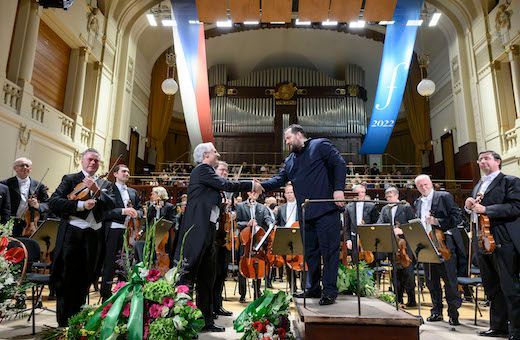Something in the mix wasn’t right. Certainly all the elements were in place for a memorable close to this year’s Prague Spring festival: a world-class orchestra, the Vienna Philharmonic; a first-rate conductor in the person of Andris Nelsons; and a solid program of Gubaidulina, Shostakovich and Dvořák. Smetana Hall, packed with many local music luminaries, buzzed with anticipation, which made the letdown at the end of the evening all the more disappointing.
The performance got off to a promising start with a brief orchestral work by Russian èmigrè Sofia Gubaidulina, who defied Soviet protocols to start collaborating with Czech composers in the 1970s. Märchen-Poem (Fairytale Poem) was composed during that period, drawing on music she wrote for a radio production of a Czech fairy tale. It includes few full orchestral passages, lurching along mostly in otherworldly solos and pizzicato string sections – all expertly done. A chamber-sized version of the orchestra displayed the full ensemble’s strengths, with a beautifully transparent sound, very fine gradations in the playing and a wealth of subtle details. The golden tones the Vienna Philharmonic is noted for added body and heft.
One of Gubaidulina’s mentors was Dmitri Shostakovich, whose Symphony no. 9 in E flat major arrived on wings – lightweight and lively, flitting around the stage and never developing any depth or seriousness of purpose. Nelsons seemed most interested in the pop of the percussion and the gymnastics in the woodwinds, taking advantage of the full orchestra’s virtuoso skills. The martial rhythms had a touch of class and the woodwinds were dazzling, caressing solo melodies, whirling in colorful combinations and offering a bright contrast to dark horns. But there was no fire, or any of the anxious, rough edges that characterize Shostakovich’s music. This was the most polite version of it played in recent memory in Prague – very clean and very deliberate, too rounded to have any bite. Even Nelsons’ conducting was understated, with economical gestures and arms held in tight.
Dvořák’s Symphony no. 6 in D major was in the same vein, with a bright surface gloss but not much underneath. Nelsons picked up the pace, adding some energy and momentum, though at the expense of cluttering the sound. Some details emerged in the second movement, which showcased fine, clear layers of strings, horns and woodwinds, topped by a lustrous glow. And slowing the tempo in that movement gave the music a chance to breathe. Otherwise the piece lacked shape and character, with pounding percussion no substitute for passion, and rapid melodies drained of emotional impact. Nelsons showed expertise but no insight, leading a bloodless interpretation of music normally played from the heart.
An encore of Johann Strauss II’s Wo die Zitronen blüh'n! brought the orchestra back to its home turf, without much better results. The strings had more lilt and the horns had a softer burnish, but the music felt perfunctory, a nod to a grand tradition and stellar reputation, neither of which were fully realized in this performance. The Dvořák symphony in particular was hollow, all glitter without any real gold.

Fortunately, the disappointing finish did not detract from an otherwise outstanding 77th year for Prague Spring. Appearances by the West-Eastern Divan Orchestra and Kyiv Soloists created important ties to current events, Gautier Capuçon showed great versatility and imagination as artist-in-residence, Mirga Gražinytė-Tyla was in masterful form conducting the City of Birmingham Symphony Orchestra and Klangforum Wien anchored a contemporary music weekend that opened an exciting new chapter for the festival. Just a year after it was restricted from staging more than a handful of live concerts, Prague Spring re-emerged as fresh and vital as ever.


